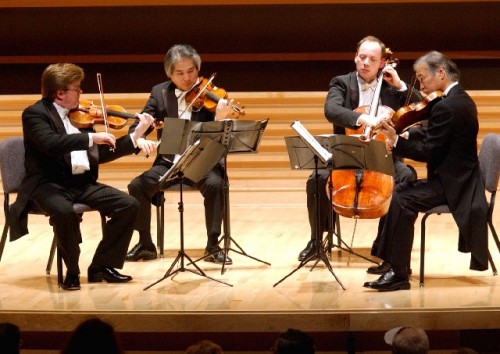The last concert of the Princeton University Concerts 2010-2011 season featured the renowned Tokyo String Quartet. The program consisted Mozart Quartet No. 15 in D Minor, Takemitsu String Quartet No. 1 "A Way A Lone," and Beethoven Quartet in B-flat Major, Op. 130.
The program itself is a stormy one. Melanchoically sublime. According to the program notes, the pieces are tied together by "influence," all of the pieces being greatly influenced by previous composers (Mozart by Haydn, Takemitsu by post-Romanticists, and Beethoven by Handel). It is interesting to note that all of these pieces were later works from each composer's life. What's more interesting is that these later works are all some of the most tumultuous pieces of each composer, and I think it is this character that defines this concert and ties together the pieces, more so than the influence. For instance, the Mozart Quartet No. 15 is the only quartet that Mozart had written in a minor key (D minor--interesting, the same key as the only minor piano concerto Mozart had written, Piano Concerto No. 20). And as for the Beethoven, excluding the infamous "Great Fugue," Op. 133 (the last piece Beethoven had written--horribly painful as Beethoven's testament to the destruction of music), the Op. 130 is one of the greatest, and most unpredictably contrasting Beethoven string quartet. Now for the Takemitsu, I am unfamiliar with his work, but Quartet No. 1 was also composed later in this contemporary composer's life (1981), and was literally (or shall I say, musically) governed by the word, "SEA" (Eb (S corresponding to German pitch designation, E, and A). In this case, the SEA was tempestuous indeed. I thought the program selection in itself already set apart this concert from others. It was definitely one of the most "emotional" concerts I've attended, one reason being because all the pieces were so profound. I treasure concerts for that emotional experience, and I certainly got it here (just maybe a bit much though).
Now many sublime and thunderous things happened in each piece, but there was one eerie external and internal instance of it that I must share. Some sublime thunder happened during the Cavatina of the Beethoven. Literally and figuratively. This movement is the definition of sublime. So much beauty and sorrow. It is said that Beethoven wept when he heard this in his head. This piece was actually sent to the heavens (okay, space--it was sent on the Voyager mission into space). What is truly uncanny is that during this movement (shortly after the heartwrenching "Beklemmt" passage, in which the first violin is "choked up" in anguished free recitative) a rumble of thunder resonated throughout the concert hall (there was a storm outside). It was as if the Gods were responding to such human suffering and sorrow; as if Beethoven had firmly said from the sky, "and let it be no more." But alas, it continues. Thank goodness it does. What would be a world with no suffering? A world without happiness?
Of course, the Tokyo String Quartet was phenomenal. I'd like to give a special shout out to the violist and cellist. In the rarer moments when I felt like things were getting rushed, the violist played with the "pauses" (but not pauses, just the inclination of a pause...) needed. I thought the violist played with the most conviction, mainly because he really played the silences. And the cellist, my goodness that deep, rich, sound gives me the chills just thinking about it! I've always been partial to cellos, but what I heard from this cello really resonated through my body and warmed it.
After the concert at the reception, I was very lucky to have gotten a chance to talk to one of the quartet members, Kikuei Ikeda (violin) and to express how much I enjoyed their performance. He was really pleased and asked me if I played any instruments, to which I replied that I was minoring in piano performance. His next response was completely unexpected and humble. He told me how exceptionally talented he thought us undergraduate musicians were (more so than graduate students), how he thought it was amazing how we were so intelligent and dedicated to our academic studies and yet exceptional musicians as well, referencing his experience teaching undergrad musicians at Yale. Well, those words awakened me like the thunder did. I was really speechless, for I would have never imagined, this world-renowned musician felt humbled by us! It's really amazing how fast perspectives can shift, how fast relationships can change; how stepping outside of your own shoes for a while makes the world a different place. Music does that in so many ways, direct (like the concert), and indirect (like the reception), and turns an otherwise normal night into one of sublime thunder.

No comments:
Post a Comment